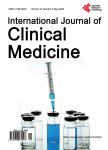Short Term Prognostic Utility of Tc-99m DMSA Renal Imaging in Sepsis Induced Acute Renal Failure;Provisional Data
Short Term Prognostic Utility of Tc-99m DMSA Renal Imaging in Sepsis Induced Acute Renal Failure;Provisional Data作者机构:Intensive Care Unit Faculty of Medicine Cairo University Cairo Egypt Nuclear Medicine Unit Faculty of Medicine Cairo University Cairo Egypt
出 版 物:《International Journal of Clinical Medicine》 (临床医学国际期刊(英文))
年 卷 期:2013年第4卷第12期
页 面:543-547页
学科分类:1002[医学-临床医学] 100214[医学-肿瘤学] 10[医学]
主 题:Acute Renal Failure Tc-99m DMSA Sepsis Induced Acute Renal Failure
摘 要:Background: Sound prognostic data in sepsis induced acute renal failure (SARF) are lacking especially on the short term outcome [STO] in the intensive care unit [ICU]. We addressed the use of Tc-99m DMSA [2,3-dimercaptosuccinicacid] renal cortical imaging as a prognostic tool in SARF. Methods: Forty patients with acute renal failure due to sepsis [age range 15-74 years;median 44.5] were subjected for full history taking complete physical examination, routine ICU monitoring, routine laboratory investigations, APACHE II [Acute Physiology and Chronic Health Evaluation] and SOFA [Sequential Organ Failure Assessment] together with Tc-99m DMSA cortical renal scintigraphy. Patients’ death in the ICU or discharge was considered as the end point of the study representing the so-called short term outcome [STO]. Results: 25% mortality rate [10/40] was found along the admission period in the ICU. All non-survivors were abnormal with DMSA imaging [NPV & PPV 100% & 66.7% respectively]. Abnormal DMSA cases showed significant positive associations with serum creatinine at admission [r = 0.5;P 0.02];admission duration [r = 0.4;P 0.002];APACHE II score [r = 0.5;P 0.004] and STO [r = 0.4;P 0.03]. Statistically significant difference was elicited between subjects with normal and abnormal DMSA regarding the same parameters. Conclusion: This preliminary data could raise Tc-99m DMSA renal imaging as a prognostic tool in SARF that could allow influential interference to prohibit dramatic outcomes as mortality.



